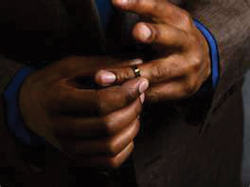Could a stressful day turn your sweetie into a cheater?
 “How a Stressful Day May Promote Infidelity,” written by psychology professor Natalie Ciarocco, reports the findings of a recent research study, revealing that stress could be a trigger for infidelity. The article appeared in the Atlantic Highlands Herald on March 8 and was published in the Journal of Social Psychology in January.
“How a Stressful Day May Promote Infidelity,” written by psychology professor Natalie Ciarocco, reports the findings of a recent research study, revealing that stress could be a trigger for infidelity. The article appeared in the Atlantic Highlands Herald on March 8 and was published in the Journal of Social Psychology in January.
The study, conducted by Ciarocco along with psychology professor Gary Lewandowski and alumnus Jessica Echevarria, determined that the stress from a long day at work or school might increase chances of cheating. In addition, the researchers observed how ego-depletion, a process of dealing with stressful situations that requires effort and leads to fatigue, makes it more difficult for individuals to control themselves.
To determine these results, researchers divided participants who were in committed, romantic relationships in two separate groups. Ciarocco wrote that the groups were brought into a room that smelled of freshly baked cookies with two plates of food, one with cookies and another with radishes. One group was forced to eat the plate of radishes to become the “ego-depletion” group and became stressed by the overwhelming scent of the cookies and their cravings while the other group was allowed to eat the cookies happily.
The article explained that attractive strangers who were part of the experiment were brought into the room to interact with participants. The confederates were told by the researchers to ask participants for their phone number and invite them out on coffee dates. Ciarocco states in the article that the results showed that participants who had faced egodepletion were three times more likely to give their phone number and accept the date.
As Ciarocco wrote in the article, “Granted, participants didn’t physically cheat on their partner, but saying yes to coffee dates and giving out one’s phone number does indicate a willingness to devote time and attention to someone other than your partner,” she now raises the consideration that situational factors may influence the choice to cheat. But can this be applied to all relationships?
Jessica DePrima, a senior social work student, found this study interesting but believes that there are too many things, other than stress, that can drive someone to cheat. “I feel like there are other factors that need to be identified to determine why participants were a little too flirty,” she said. “Were the participants happy in their relationships, or have they cheated or been cheated on before, or maybe were they just being polite to the stranger?”
With this question, DePrima challenges the researchers to further their studies. “What I would like to know is if the participants in the study actually followed through with these dates or getting in touch with each other after the research had been completed.”
Other students also shared the same ideas as DePrima and still adhere to the popular saying, “Once a cheater, always a cheater.” Jaclyn DiMeo, a senior business management major also questioned the findings of the study and said, “I don’t see how all of a sudden, after one stressful day, someone would become an unfaithful person.”
“I could see if someone cheated in a relationship if that relationship was causing the stress,” she commented, “but ruining a good relationship because of one stressful day seems like a pretty lame excuse.”
Sophomore communication major Jon Guida also had mixed emotions towards the claims made by the study. “I’ve never cheated on a girlfriend,” he said, “but I’ve had plenty of stressful days, between classes and baseball, that when they’re finally over, I’m obviously physically and mentally tired.”
Regardless of how stressful his days are, Guida mentioned that if he’s in a committed relationship, he still knows the difference between being faithful and unfaithful. “I think it’s sort of a cop out for someone to blame cheating on a stressful day,” he added. “Everyone gets stressed, but not everyone cheats.”
Sarah Kirk, on the other hand, tried to understand the results of the study with a little bit of humor. “I could see if maybe a person had a stressful day at work and then went out after to unwind and maybe got into some trouble,” joked the senior communication major.
“If these findings really are true,” Kirk mentioned with a laugh, “boyfriends are going to have a new excuse and girlfriends are going to be keeping their boyfriends on a short leash after long days.”



